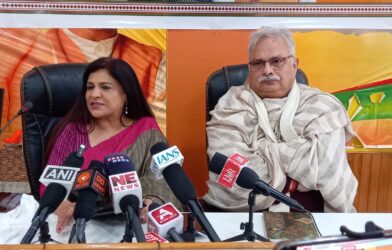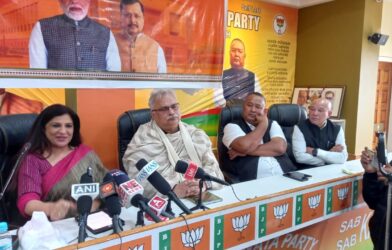Dated: Shillong 23rd February 2018Â
The Government of Mr. Narendra Modi, Prime Minister of India, through the Finance Minister, Mr. Arun Jaitley, in August 2017 Session of the Parliament (Lok Sabha) had introduced a draconian Bill by the name of ‘Financial Resolution and Deposit Insurance Bill, 2017’, which it says is to protect the interest of depositors in the banking industry of the Country. But in reality, the major aim of this draconian Bill is to ‘bail in’ the bankrupt financial institutions of the country.
During its introduction in the Parliament it was vehemently opposed by some major political opposition and parties and others. Now the Bill had been referred to the Joint Committee of Parliament and subsequently to the Standing Committee; and almost all Bank Trade Unions, which is being spearheaded by the All India Bank Officers’ Confederation (AIBOC), whose General Secretary, Mr. D.T Franco Rajendra Dev, had appeared before the Standing Committee to voice and present his views on the un-customer friendly nature of the Bill, which would rob the depositors of their hard-earned money in the form of their deposits to the Banks, in the event of the liquidation of banks. In this direction, AIBOC had launched a countrywide signature campaign against it; and these had been submitted to the concerned authorities, amounting to more than a lakh signatures.
The Finance Minister, Mr. Arun Jaitley, in a Tweet wrote, ‘The Financial Resolution and Deposit Insurance Bill, 2017 is pending before the Standing Committee. The objective of the government is to fully protect the interest of the financial institutions and depositors.’ But the real agenda of the government is to protect the financial institutions at the cost of the honest & poor depositors, because of the misdeeds of the big corporate & other high profile defaulters, of the like of Vijay Mallya & Nirav Modi! That is why the Bank Unions are deadly against its introduction and subsequent passage.
The Centre’s proposed Financial Resolution and Deposit Insurance Bill, 2017 (FRDI) has created fear & panic in the minds of the people as it purportedly allows failing banks to use depositors’ money to cut losses.
An online petition by one Shilpa Shree at Change.org, titled ‘Do not use innocent depositors’ money to bail in mismanaged banks #NoBailin’, has been signed by close to 70,000 people. The petition says, ‘This Bill gives power to a government entity to use depositors’ money to save a bank on verge of bankruptcy. This government entity can declare the bank doesn’t owe you any money though you have deposited your hard earned money with it. Yes! why I have started this petition asking the Finance Minister, Arun Jaitley to remove the ‘Bail-in’ portion from the FRDI Bill’.
The Bill seeks to deal with insolvency of financial service providers. It provides for the establishment of a Resolution Corporation with powers relating to transfer of assets to a healthy financial firm, merger or amalgamation, liquidation to be initiated by an order of the National Company Law Tribunal.
The Bill says that in case of a bank failure, the proposed Corporation will provide deposit insurance up to a certain limit, which has not been specified. Currently, bank deposits of up to Rs. 1 Lakh are insured, but there are few banks that have failed in India in recent years, as the Reserve Bank Of India (RBI) has stepped in to work out a resolution without creating any risk for the depositors.
The Bill suggested that the use of the ‘bail in’ provision may result in the cancellation of liability, which could extend to bank deposits or could lead to modification of the terms or changing the form of the asset class. The provision would be the last in the line for payments in case of liquidation. This is a damning provision for all depositors in the financial institutions.
The deposit insurance scheme currently covers all banks, commercial, regional rural & co-operative banks. However, the government says the provisions in the FRDI Bill do not modify present protections to the depositors, adversely at all. Rather they provide additional protections to the depositors in a more transparent manner; it said in its Press statement, which reads as, ‘The FRDI Bill is far more depositor friendly than many other jurisdictions, which provide for statutory bail in; where consent of creditors/ depositors is not required for bail in. The FRDI Bill does not propose in any way to limit the scope of powers for the Government to extend financing and resolution support to banks, including Public Sector Banks. The Government’s implicit guarantee for Public Sector Banks remains unaffected’.
But this statement of the government is far from the truth, because under the current Deposit Insurance and Credit Guarantee Corporation Act, 1961, any amount of more than Rs. 1 Lakh in a deposit account could be forfeited in the event of a bank failure. However, the FRDI Bill proposes a Resolution Corporation to be be set up and it, in consultation with the Reserve Bank Of India, would fix the threshold for deposit insurance. This suggests that the government is considering in increasing the insured amount in deposits since the compensation was last fixed almost 25 Years ago.
The limit of Rs. 1 Lakh covered most of the bank accounts, 25 years ago, when only a small portion of the accounts held more than Rs. 1 Lakh. Today, the government may have to raise the deposit insurance cover by more than 12 times in the Insurance Bill, if it has to ensure the safety net, for at least 90 % of deposits, which was the base when the limit was last revised, a quarter of a century ago. As of March 2016, 97 % of the deposit accounts had Rs.15 Lakh or less.
Here is what the customers need to consider, currently, banks have to pay a premium of about 10 Paise per Rs. 100 deposit insured to DICGC. Any hike in the threshold would raise the amount of premium that banks will ahve to shell out. If the government raises the limit to Rs.15 Lakh, from the present Rs. 1 Lakh, the premium too will go up steeply, as per ‘Economic Times’ analysis. Can the banks afford to bear the higher premium cost? At present, the banks pay the premium, but if it goes up, the customers may have to pay for it, above a certain limit. So, there could be a cost to keeping your deposits safe.
Mr. Kuntal Sur, Partner, Financial Services (Risk & Regulation) Leader, PwC India, said, ‘If we adjust inflation since 1993, deposit insurance requires a substantial jump. Where the amount should be— that is obviously open for debate, but it should at least cover 60-70 per cent. I don’t see 90-100 per cent of the overall deposits being covered’.
‘Currently, banks have to pay a premium of about 10 paise per Rs. 100 insured. Any hike in the threshold would raise the amount of premium that banks will have to shell out. But even under the new regime, you can expect that the cost of deposit insurance for banks should go up ideally’, said, Sur.
Group Head of the Financial Sector Rating(ICRA), Mr. Karthik Srinivasan, said, ‘Rs. 1 Lakh deposit insurance is hardly anything in today’s context, and it’s been nearly 25 years that amount was revised. Keeping in mind inflation, cost of living, I personally believe Rs. 5 Lakh is a reasonable number.’
‘Whether the banks should bear the premium amount or should the charges be passed on to the deposit holders is a debatable topic’, said Srinivasan.
To summarize about the adverse implications of the proposed FRDI Bill, 2017, if it is passed in the Parliament, the depositors would be the most to suffer, as they either may lose a substantial sum of their hard earned savings(deposits) in the banks, in the event of the liquidation of the banks; or they may have to bear the insurance premium burden payment on their own deposits up to a threshold limit, to be mandated by the proposed Resolution Corporation in consultation with the RBI; also losing their deposits beyond the insured threshold limit.
Thus, we may conclude that FRDI Bill is ‘Forget & Rob Depositors’ Interests Bill’!, a Bill that is a Dragon that would spill fire and burn the depositors hard earned money overnight.
Compiled by:
Mr. Michael L’Chyne, General Secretary, Meghalaya Rural Bank Officers’ Association,
H.Q. Shillong & Joint General Secretary, All India Regional Rural Bank Officers’ Federation, H.Q.: Siliguri, with in puts from national news print media and social media.







